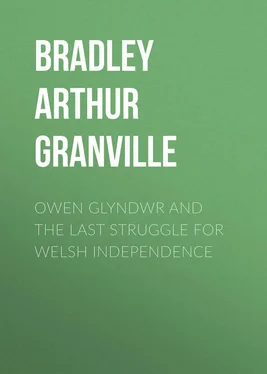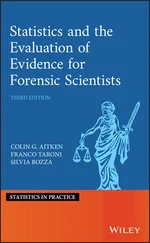Arthur Bradley - Owen Glyndwr and the Last Struggle for Welsh Independence
Здесь есть возможность читать онлайн «Arthur Bradley - Owen Glyndwr and the Last Struggle for Welsh Independence» — ознакомительный отрывок электронной книги совершенно бесплатно, а после прочтения отрывка купить полную версию. В некоторых случаях можно слушать аудио, скачать через торрент в формате fb2 и присутствует краткое содержание. Жанр: foreign_antique, foreign_prose, foreign_language, на английском языке. Описание произведения, (предисловие) а так же отзывы посетителей доступны на портале библиотеки ЛибКат.
- Название:Owen Glyndwr and the Last Struggle for Welsh Independence
- Автор:
- Жанр:
- Год:неизвестен
- ISBN:нет данных
- Рейтинг книги:5 / 5. Голосов: 1
-
Избранное:Добавить в избранное
- Отзывы:
-
Ваша оценка:
- 100
- 1
- 2
- 3
- 4
- 5
Owen Glyndwr and the Last Struggle for Welsh Independence: краткое содержание, описание и аннотация
Предлагаем к чтению аннотацию, описание, краткое содержание или предисловие (зависит от того, что написал сам автор книги «Owen Glyndwr and the Last Struggle for Welsh Independence»). Если вы не нашли необходимую информацию о книге — напишите в комментариях, мы постараемся отыскать её.
Owen Glyndwr and the Last Struggle for Welsh Independence — читать онлайн ознакомительный отрывок
Ниже представлен текст книги, разбитый по страницам. Система сохранения места последней прочитанной страницы, позволяет с удобством читать онлайн бесплатно книгу «Owen Glyndwr and the Last Struggle for Welsh Independence», без необходимости каждый раз заново искать на чём Вы остановились. Поставьте закладку, и сможете в любой момент перейти на страницу, на которой закончили чтение.
Интервал:
Закладка:
A fierce onslaught in great force brought the invaders to the walls of the Roman-British city of Uriconium, where Cynddylan, Prince of Powys, with all the power of Central Wales, made a vain but gallant effort to arrest the ruin:
Cynddylan with heart like the ice of winter.
Cynddylan with heart like the fire of spring.
He and his brothers were at length all slain, and his armies routed. Uriconium or Tren was sacked, and higher up the valley the royal palace at Pengwern, as Shrewsbury was then called, was destroyed.
These terrible scenes are described for us by Llywarch Hên, one of the earliest British bards, himself an actor in them, who thus laments over the wreck of Pengwern:
“The Hall of Cynddylan is dark
To-night, without fire, without bed;
I’ll weep awhile, afterwards I shall be silent.
“The Hall of Cynddylan is gloomy
To-night, without fire, without songs;
Tears are running down my cheeks.
“The Hall of Cynddylan, it pierces my heart
To see it roofless, fireless;
Dead is my chief, yet I am living.”
or again, on the destruction of Tren:
“The eagle of Pengwern screamed aloud to-night
For the blood of men he watched;
Tren may indeed be called a ruined town.
“Slain were my comrades all at once
Cynan, Cynddylan, Cyncraith,
Defending Tren the wasted city.”
In a few years the Saxons were beaten back, and Pengwern, with the surrounding country, once more became British, and remained so till the days of Offa, King of Mercia.
By the close of the sixth century Christianity had been introduced by Augustine into the south-eastern corner of England, and there is no more suggestive scene in Welsh history than the famous meeting of the great missionary with the Welsh bishops on the banks of the Severn. It accentuates in a striking manner the cleavage between the Eastern or the Latin Church, and that of the West and of the Welsh. Augustine, about the year 601, fresh from his victories over paganism among the Kentish Saxons, and having journeyed far through still heathen regions, approaches these Western Christians with a kindly but somewhat supercilious and superior air. The seven Welsh bishops – or so-called bishops, for the full development of the office as understood later was not yet completed – were ready waiting for him on the banks of the lower Severn. They were a deputation of the Welsh Church, and, seeming already to scent patronage in the air, were fully prepared to resent any sign of it in the Roman missionary. The latter, it appears, knew very little about the Western Church, with its roots in Ireland, Armorica, and Gaul, and what he did know he did not like.
The arrogance of Augustine fully justified the Welshmen’s suspicions, and he still further roused their indignation by hinting that they should take their instructions and receive their consecration from Canterbury, as representing Rome. Coming from a man who appeared to them but the missionary bishop of a handful of recently converted barbarians, this was a little too much for ecclesiastics who had behind them three or four centuries of Christianity, and knew nothing whatever of the Latin Church. Augustine, too, spoke disparagingly of their customs, and with particular severity of the absence of celibacy in their Church. This must have touched them to the quick, seeing that numbers of the offices and benefices in the Western Church were more or less hereditary, and that even saintship was frequently a matter of family, the tribal sentiment being predominant. All these things, together with their difference in Easter observance and in shaving the head, horrified Augustine, and he spoke so freely as to put all hope of combination out of the question. Indeed, the Welsh divines were so offended that they refused even to break bread beneath the same roof as the Roman saint. At a second conference Augustine, seeing he had gone too far, proposed that, even if they could not conform to each other’s customs, they should at least combine in efforts to convert the rest of England. Such endeavours did not commend themselves in the least to the Welshmen. Whatever missionary zeal may have existed among Welsh churchmen it did not include the slightest anxiety about the souls of the accursed conquerors of Britain, the ruthless ravagers and destroyers of their once civilised and Christian country. It is probable that Augustine did not realise the fierce hate of the despoiled Celt towards the Saxon. At any rate his patience at length gave way, and as a parting shot he in effect told the Welshmen that since they shewed themselves so criminally careless about Saxons’ souls, they should of a surety feel the prick of Saxon spears. This random threat, for it could have been nothing more, was strangely fulfilled within a few years’ time, when the victory of the pagan Ethelfred at Chester, which sundered the Britons of Wales from those of North-Western England, culminated in the sacking of Bangor Iscoed and the slaughter of twelve hundred monks.
This futile conference of 601 marks the beginning of the long struggle of the Welsh or Ancient British Church to keep clear of the authority of Canterbury, and it lasted for some five hundred years. Till the close of the eleventh century the bishops of the four Welsh dioceses were, as a rule, consecrated by their own brethren. St. David’s perhaps took rank as “primus inter pares” for choice, but not of necessity, for there was no recognised Welsh metropolitan. Ages afterwards, when Canterbury had insidiously encroached upon these privileges, the Welsh clergy were wont to soothe their wounded pride by the assurance that this transfer of consecration had come about as a matter of convenience rather than of right. Long, indeed, before the final conquest of Welshmen by Edward the First, their Church had been completely conquered, anomalous though such an inverted process seems, by Norman bishops. A Welshman, though his sword might still win him political recognition and respect, had little more chance of Church preferment in the thirteenth century than he had in the eighteenth or the first half of the nineteenth. As early indeed as 1180 that clerical aristocrat of royal Welsh and noble Norman blood, Giraldus Cambrensis, pertinently asks the same question which from generation to generation and from reign to reign through the Hanoverian period must have been on every native churchman’s tongue in the Principality, “Is it a crime to be a Welshman?”
There is no occasion to enlarge upon the subtle methods by which the Norman Church anticipated the Norman sword in Wales. Sleepless industry no doubt was one. Another was the agency of the newer monasteries, filled with Norman, English, and foreign monks and for the most part devoted to the Latin Church. Persistent denial of the validity of St. David’s in the matter of consecration may in time, too, like the continuous drip of water on a stone, have had its effect upon the Welsh, even against their better judgment. On one occasion we know that some of their princes and nobles, stung by what they regarded as excessive exactions on the part of the Church, stooped so far as to throw in the faces of their prelates the taunt that their consecration was invalid. Such an attitude did not tend to lighten the immense pressure which was exercised in favour of the supremacy of Canterbury; and long before Welsh princes had begun to take orders from Norman kings, Welsh bishops were seeking consecration from Canterbury, unless indeed their thrones were already filled by Norman priests.
Читать дальшеИнтервал:
Закладка:
Похожие книги на «Owen Glyndwr and the Last Struggle for Welsh Independence»
Представляем Вашему вниманию похожие книги на «Owen Glyndwr and the Last Struggle for Welsh Independence» списком для выбора. Мы отобрали схожую по названию и смыслу литературу в надежде предоставить читателям больше вариантов отыскать новые, интересные, ещё непрочитанные произведения.
Обсуждение, отзывы о книге «Owen Glyndwr and the Last Struggle for Welsh Independence» и просто собственные мнения читателей. Оставьте ваши комментарии, напишите, что Вы думаете о произведении, его смысле или главных героях. Укажите что конкретно понравилось, а что нет, и почему Вы так считаете.












